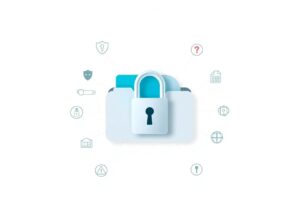
Today, data protection has become one of the main concerns for companies and users, especially with the increased use of mobile devices. These devices not only contain personal information but also critical corporate data, making them vulnerable targets for cyberattacks. Preventing data leaks on mobile devices is essential to ensure information security and protect a company’s integrity.
What Are Data Leaks on Mobile Devices?
A data leak occurs when sensitive information, such as passwords, financial data, or personal information, is stolen or accessed without authorization. In the case of mobile devices, these leaks can happen through unsecured applications, public Wi-Fi networks, or even due to the loss or theft of the device. Preventing data leaks requires adequate strategies to mitigate risks and protect the information that circulates and is stored on these devices.
Strategies to Prevent Data Leaks on Mobile Devices
1. Implement Security Policies in the Company
Companies should establish clear policies regarding the use of mobile devices by employees, especially those who access sensitive data. The implementation of a well-defined security policy is the first step to preventing data leaks. This policy should include the installation of security software, the restriction of unauthorized applications, and the supervision of access to corporate systems.
2. Use Secure and Updated Applications
One of the most common ways data can be compromised is through malicious applications. Keeping applications updated with the latest security patches is essential to preventing data leaks. Companies should provide lists of approved applications and conduct frequent audits to ensure that the apps on employees’ devices meet security standards.
3. Data Encryption on Mobile Devices
Data encryption converts information into an unreadable format for anyone without authorized access. Implementing encryption on mobile devices is one of the most effective strategies to prevent data leaks. If a mobile device is stolen or lost, encryption ensures that the data cannot be read without the correct decryption key.
4. Use of Secure Networks
Public Wi-Fi networks pose a significant risk to data security. Cybercriminals can intercept information transmitted over unsecured networks, potentially leading to data theft. To prevent data leaks, it is important that employees avoid using public Wi-Fi networks and instead use virtual private networks (VPNs), which add an extra layer of security by encrypting communications.
5. Implementation of Multi-Factor Authentication
Multi-factor authentication (MFA) is a security measure that requires more than one method of verification to access sensitive data. With MFA, even if an attacker obtains a password, they would need an additional layer of authentication, such as a code sent to the user’s mobile device, to access the information. This method is highly effective in preventing data leaks by adding an extra level of protection.
Case Studies: Data Leaks on Mobile Devices
Over the past few years, various companies have experienced data leaks due to the lack of appropriate strategies to protect mobile devices. For example, in 2020, a massive data breach affected a hospital chain that did not implement security policies for employees’ mobile devices. The lack of encryption and connection to public Wi-Fi networks resulted in the exposure of personal information of thousands of patients. This incident underscores the importance of preventing data leaks with proper security measures.
Continuous Monitoring and Security Audits
To ensure the security of data stored on mobile devices, it is essential that companies conduct regular security audits. These audits help identify vulnerabilities in the system and adjust security policies as needed. Continuous monitoring is also crucial as it allows organizations to detect suspicious activities in real-time, which is essential to preventing data leaks.
Employee Education and Awareness
No matter how many security policies a company implements, if employees are not informed about the risks and do not follow proper protocols, data leaks will continue to be a threat. Education and awareness about the importance of data security on mobile devices are key to reducing risks. Offering periodic training programs on how to protect personal and corporate information can be one of the most effective ways to prevent data leaks.
Future of Preventing Data Leaks on Mobile Devices
As more companies adopt remote work and the use of mobile devices increases, strategies to prevent data leaks must also evolve. Artificial intelligence (AI) and machine learning are playing an increasingly significant role in identifying and mitigating threats in real-time. AI-powered cybersecurity solutions can identify anomalous patterns in user behavior and alert organizations to potential attacks before they happen.
Remote Monitoring of Mobile Devices
One of the most effective ways to prevent data leaks is through the remote monitoring of mobile devices used to access corporate information. This involves the use of specialized software that allows companies to track the location of devices, lock them in the event of loss or theft, and even erase data remotely if suspicious activity is detected. With these tools, organizations can respond quickly to threats and prevent data leaks before irreversible damage occurs.
Remote monitoring also enables companies to control which applications are installed on devices, ensuring that only approved and security-compliant apps are used. This approach is particularly useful in remote work settings, where employees use their own personal devices to access the company network.
Mobile Device Management (MDM)
Mobile Device Management (MDM) is another key strategy to prevent data leaks on mobile devices. MDM refers to the set of policies and technologies that enable companies to centrally manage their employees’ mobile devices. With an MDM system in place, companies can enforce security settings, such as the mandatory use of complex passwords and the activation of data encryption.
Additionally, MDM solutions allow companies to segregate corporate data from personal data, facilitating the remote deletion of corporate information in case the device is lost or stolen without affecting the user’s personal data. This not only ensures that corporate data is protected but also respects user privacy, which is crucial in work environments where employees use their personal devices for work—a model known as BYOD (Bring Your Own Device).
BYOD Policies and Data Protection
The BYOD model has gained popularity in recent years, allowing employees to use their own devices to access corporate systems and data. While this approach can enhance productivity and flexibility, it also presents significant risks to data security. Preventing data leaks in a BYOD environment requires a strategic approach that balances user convenience with the need to protect sensitive information.
A common solution is the implementation of corporate containers on personal devices, which allows companies to separate personal information from corporate data. This not only helps to prevent data leaks but also ensures that, in the event of loss or theft of the device, corporate data can be remotely erased without affecting the employee’s personal data.
Continuous Vulnerability Assessment
The landscape of mobile threats is constantly changing, which is why it is crucial for companies to conduct regular assessments of vulnerabilities on their mobile devices. This involves conducting periodic security audits to identify potential failures or gaps in existing protection systems. By doing so, organizations can update their security policies and tools to mitigate future risks.
These assessments should also include penetration tests, which simulate cyberattacks to detect vulnerabilities in the network and mobile devices. Such tests allow companies to stay ahead of attackers’ tactics and apply preventive measures, which is essential to preventing data leaks.
Use of Advanced Mobile Security Software
Mobile security solutions have evolved significantly in recent years, with advanced tools utilizing artificial intelligence (AI) and machine learning to detect threats in real-time. These solutions can analyze user and device behavior to identify unusual activities that may indicate a potential security breach.
For example, if an employee suddenly accesses large amounts of corporate data from a mobile device in an unusual geographic location, the mobile security system can flag this activity as suspicious and send an alert to the security team. This type of technology is essential for preventing data leaks, as it allows companies to respond quickly to potential threats.
Implementation of Data Loss Prevention (DLP) Solutions
Data Loss Prevention (DLP) solutions have become a key tool for protecting confidential information on mobile devices. These solutions monitor device and network activity to ensure that sensitive data is not shared without authorization, either intentionally or accidentally. DLP solutions can also block the transmission of sensitive data to unauthorized applications or platforms, helping to prevent data leaks.
Additionally, DLP solutions can implement controls that limit access to certain files or data based on the user’s role within the company. For example, a sales employee may not need access to financial data, so their device could be restricted from accessing that information. This type of segmentation helps reduce the risk of data leaks.
Consequences of Data Leaks on Mobile Devices
The consequences of a data leak on a mobile device can be devastating for a company. Beyond fines and legal sanctions for non-compliance with data protection regulations, such as the General Data Protection Regulation (GDPR) in Europe, a data breach can severely damage a company’s reputation. Clients and business partners may lose trust in an organization that does not adequately protect its information, which can result in economic losses and long-term business opportunity setbacks.
Moreover, data leaks can also lead to the exposure of trade secrets or intellectual property, which could give competitors an unfair advantage. This is why preventing data leaks is not just a matter of legal compliance but also a long-term business protection strategy.
Conclusion
Preventing data leaks on mobile devices is an increasing challenge that requires a comprehensive approach covering everything from the implementation of security policies to the use of advanced technologies such as encryption and artificial intelligence. As the use of mobile devices continues to grow, companies must be prepared to protect their most valuable data, minimizing the risk of leaks and ensuring the trust of their clients and business partners.
Incorporating strategies such as multi-factor authentication, MDM implementation, and the use of secure networks are just some of the key steps to maintain security on mobile devices. Companies that adopt a proactive approach to preventing data leaks will be better positioned to face future challenges and protect the integrity of their sensitive information.






No comment yet, add your voice below!